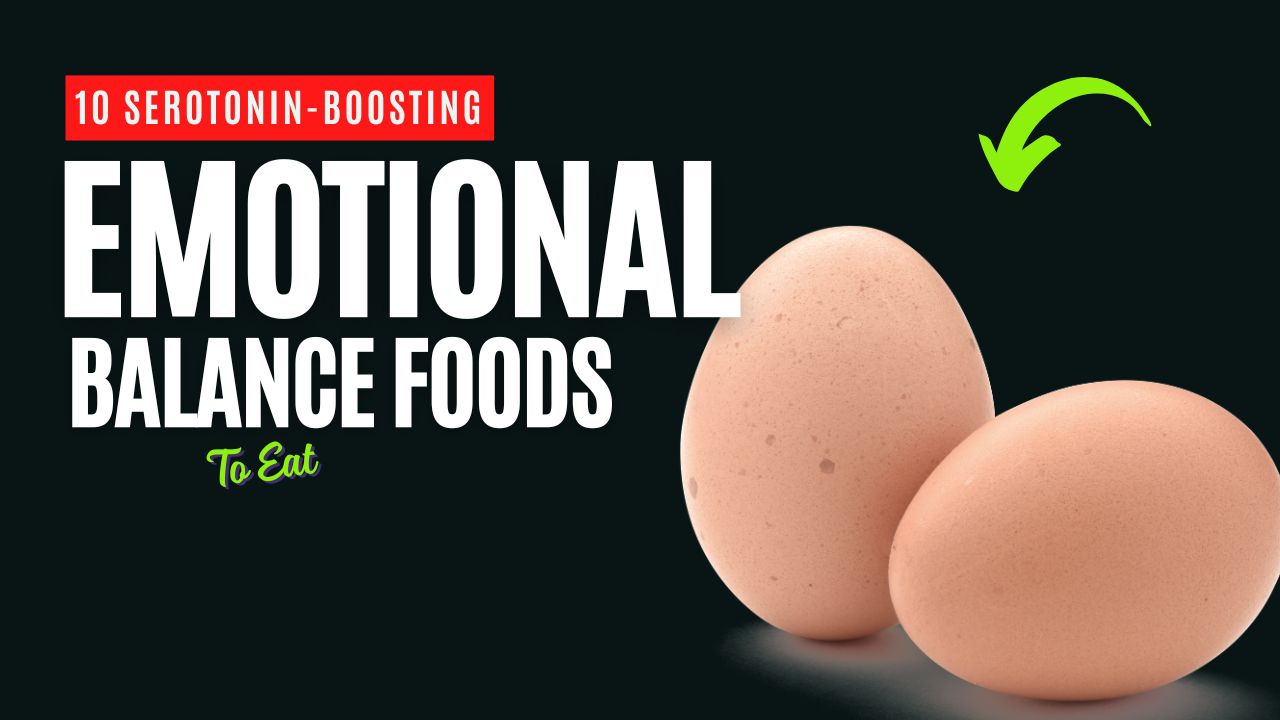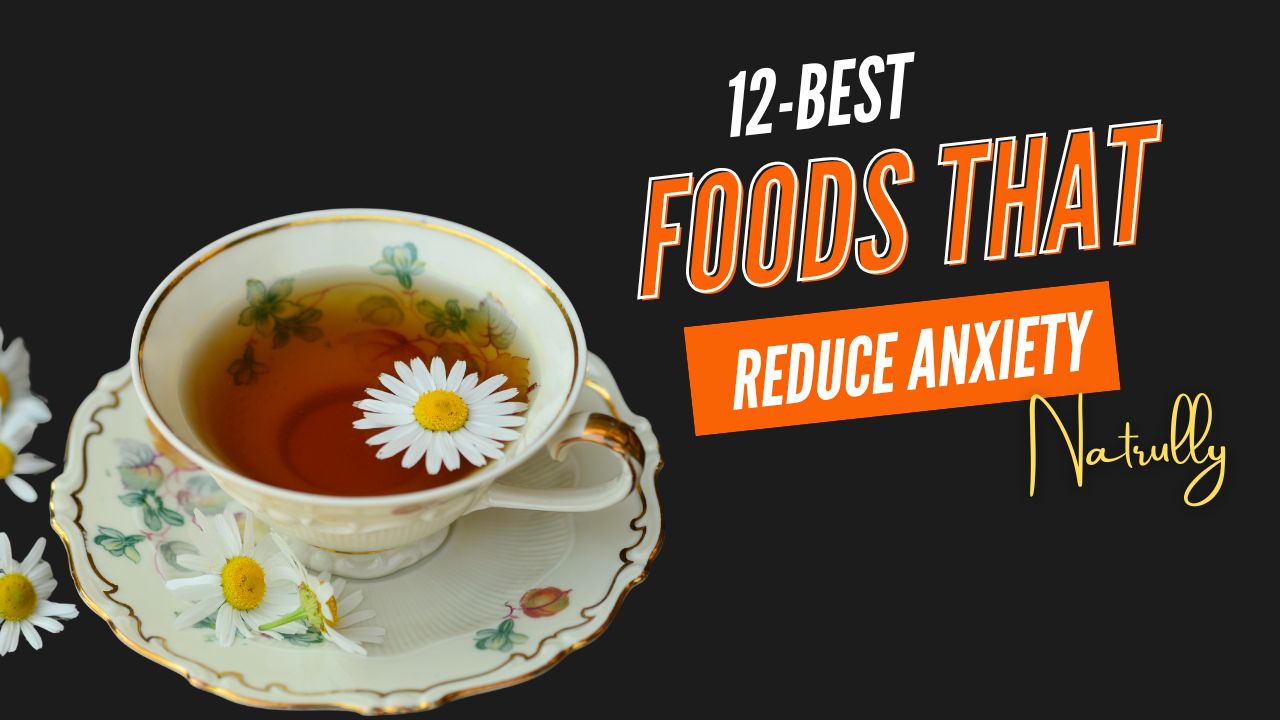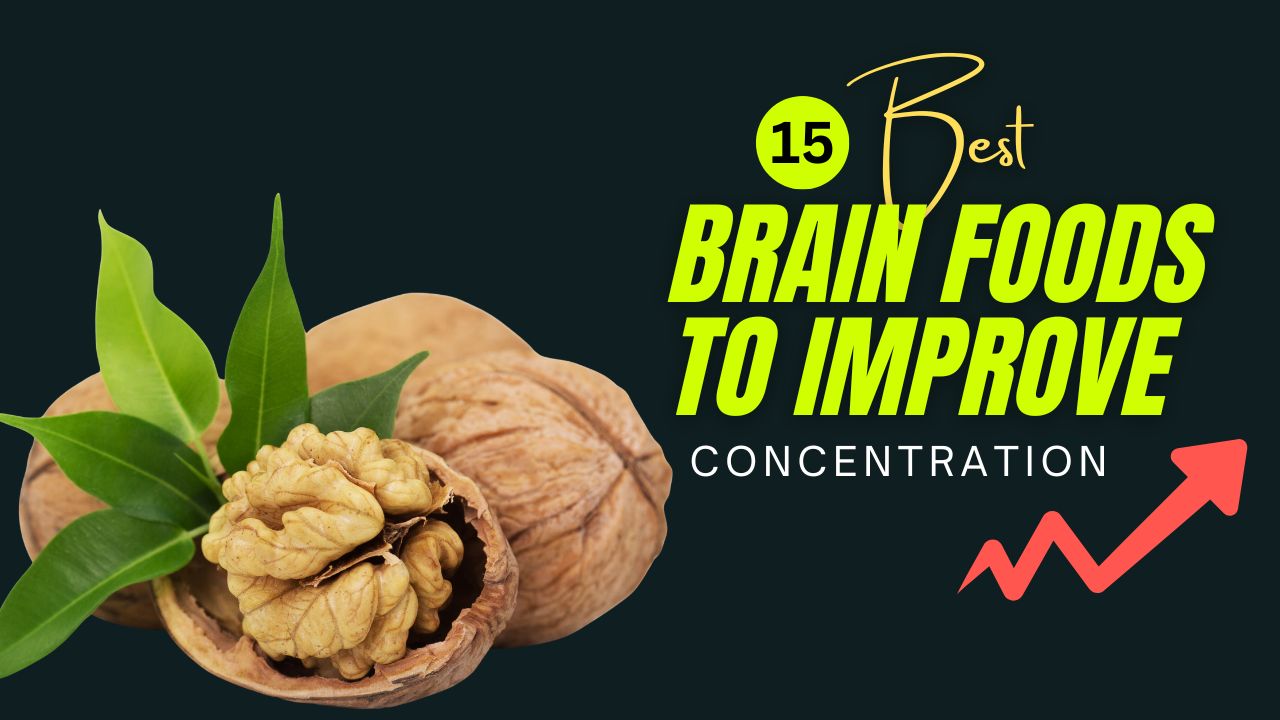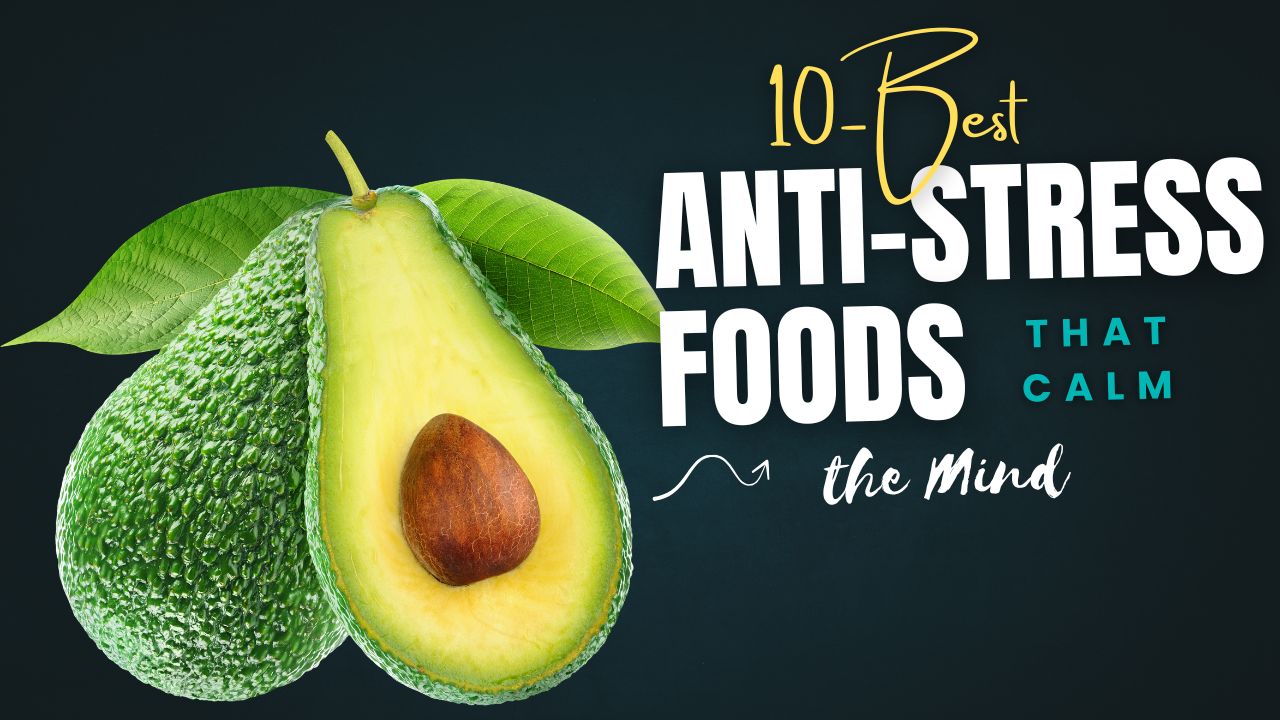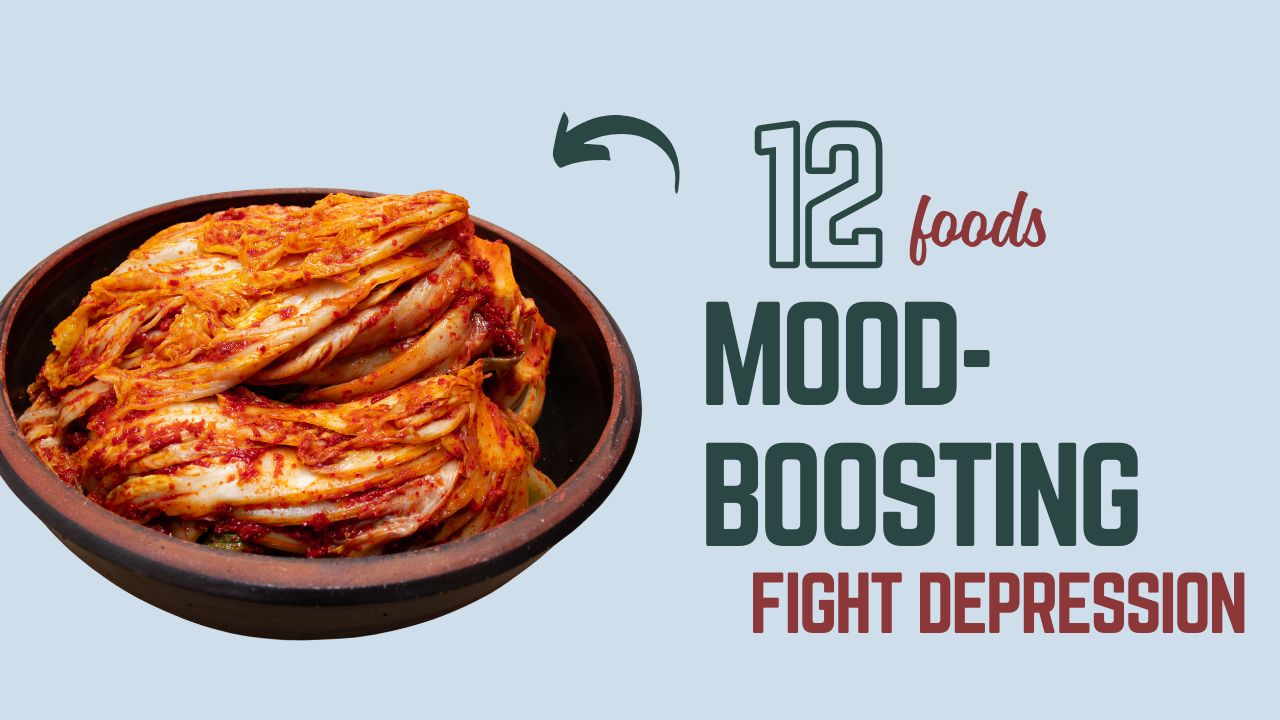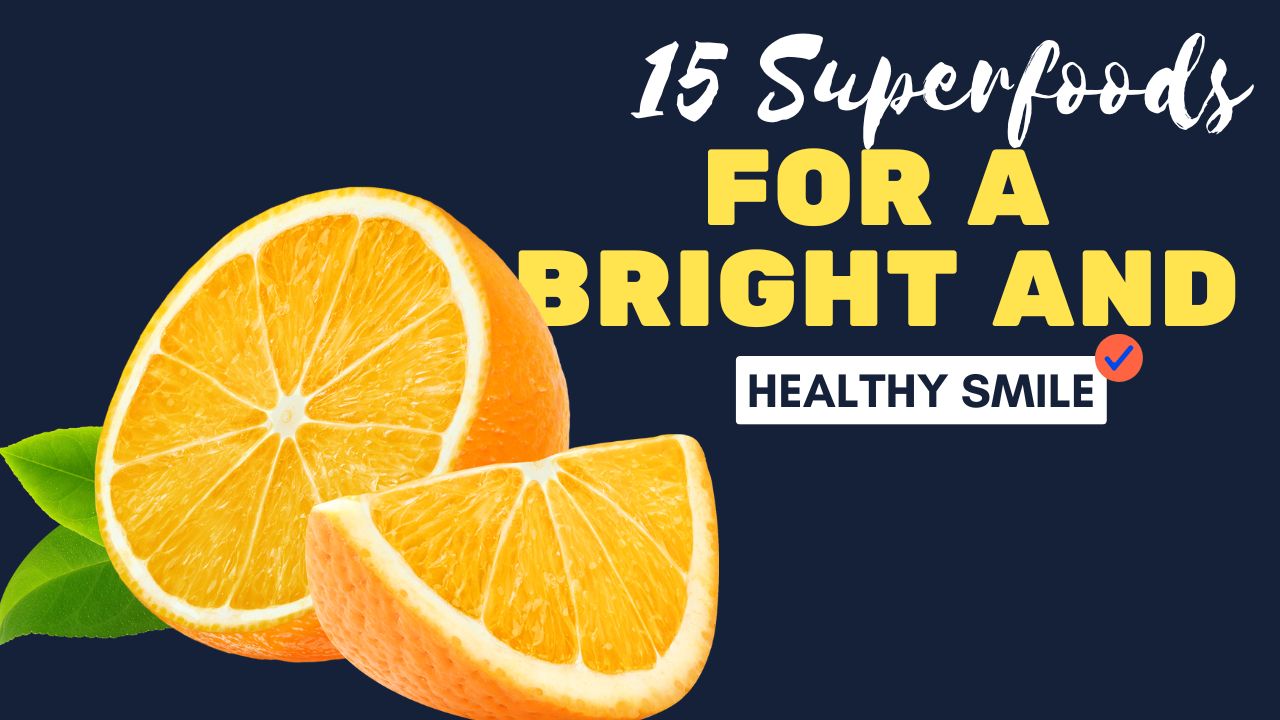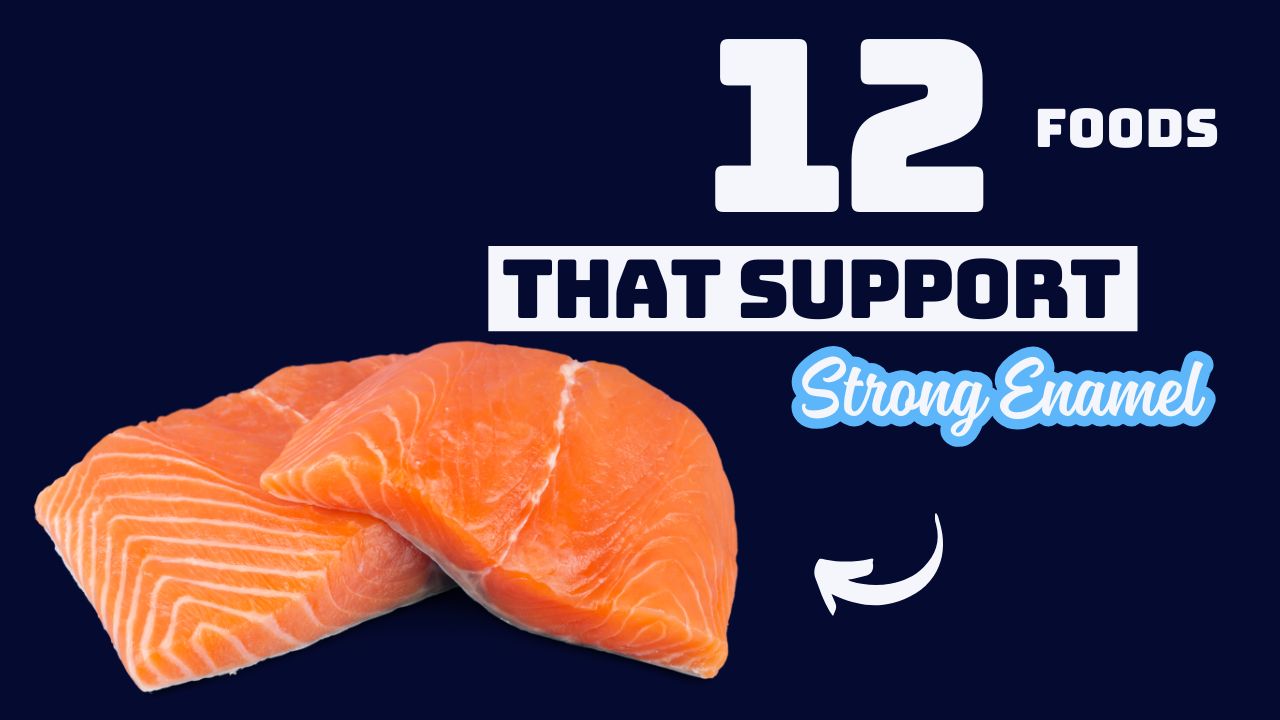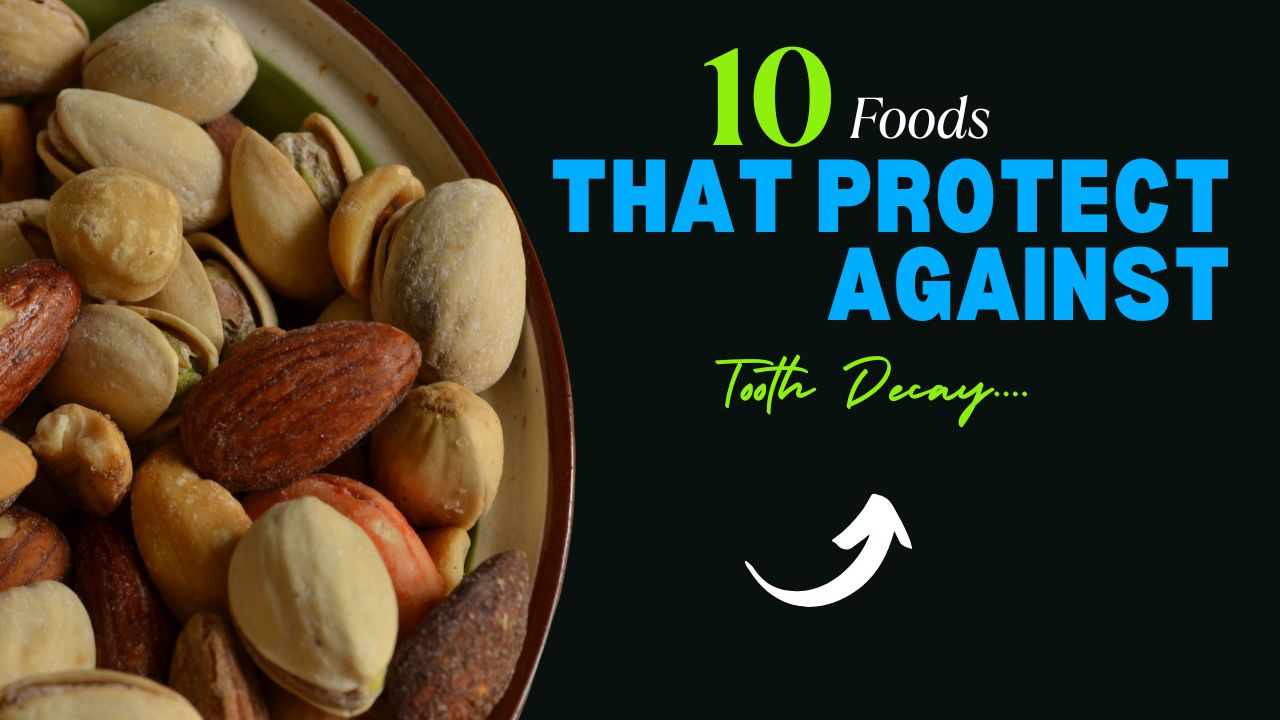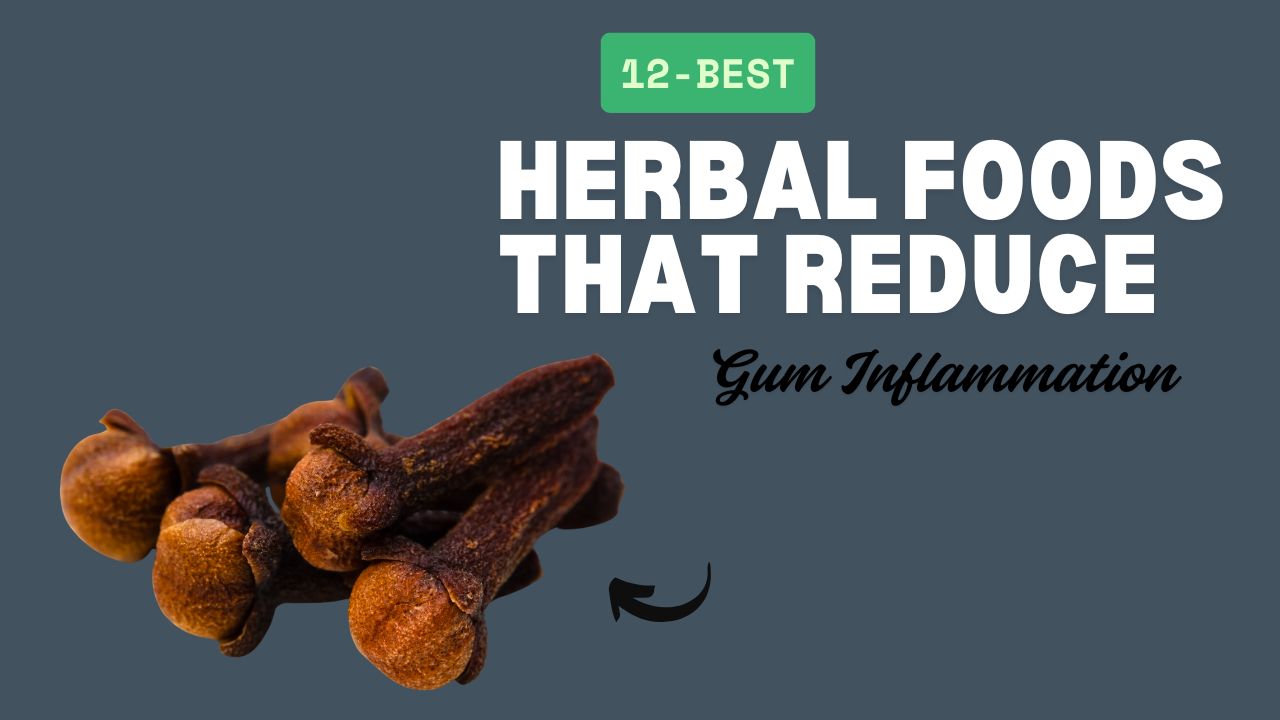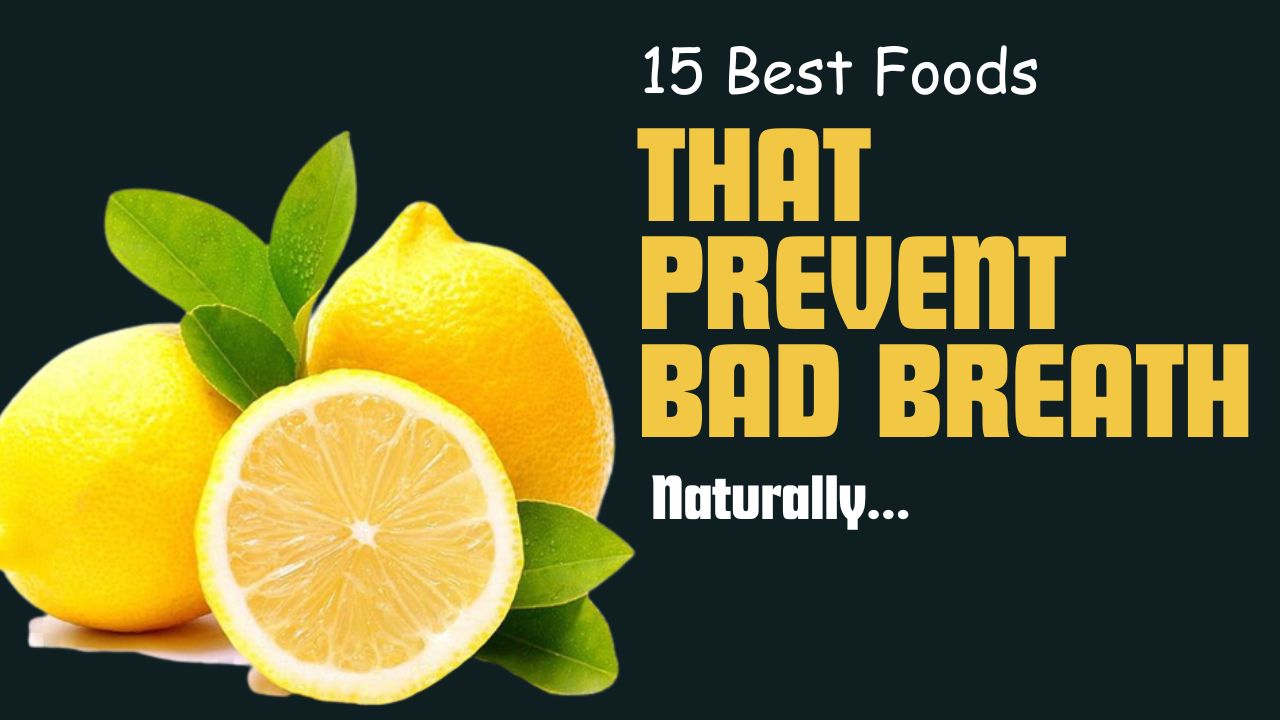Did you know that what you eat can have a direct impact on your mental health? While most people think of food as just fuel for the body, research shows that certain foods can calm the nervous system, balance brain chemicals, and help reduce symptoms of anxiety.
In fact, about one in three adults worldwide struggles with anxiety at some point, and while therapy and lifestyle changes play a huge role, your diet is one of the most overlooked natural remedies.
This article will explore 12 scientifically backed foods that reduce anxiety naturally. You’ll learn:
- The unique nutrients in each food that support mental health.
- The best ways to eat or use them for maximum benefit.
- Who should eat them, who should avoid them, and storage tips.
- Do’s & Don’ts, plus any possible side effects.
Let’s dive in and uncover how small tweaks in your diet can lead to a calmer, more balanced mind.
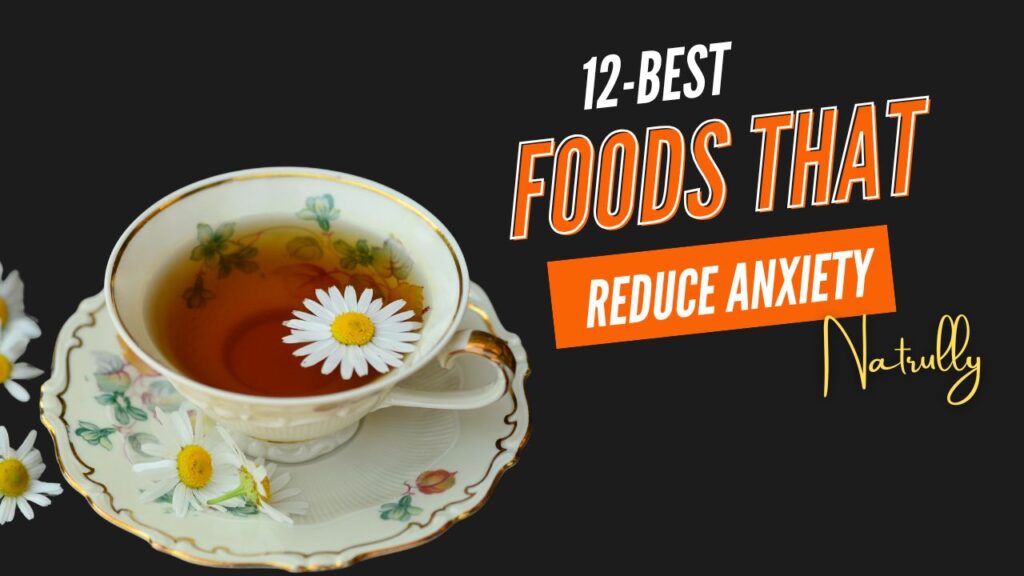
Table of Contents
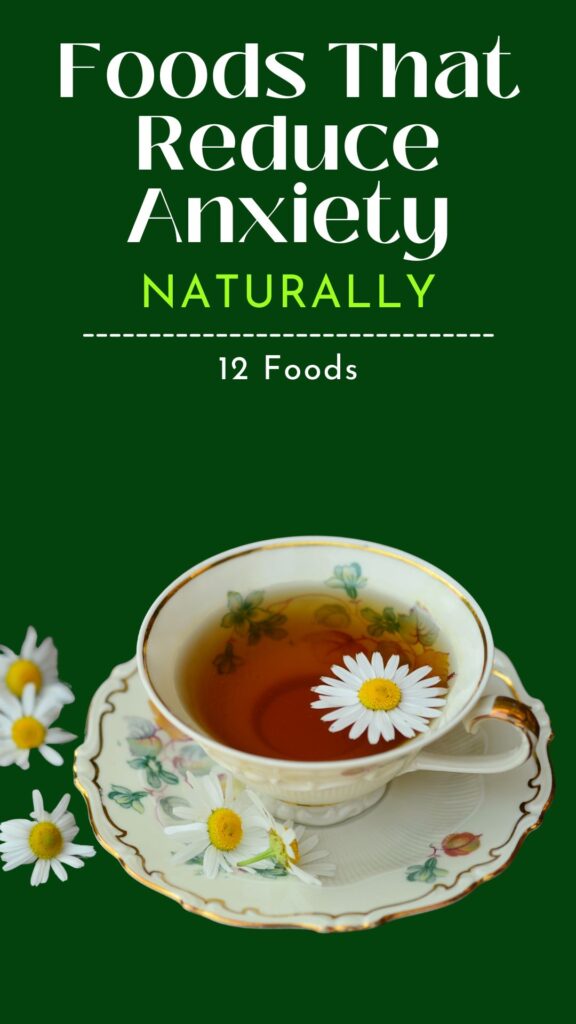
12 Effective Foods To Reduce Anxiety
1. Salmon
Omega-3-rich fish like salmon are powerful allies against anxiety. They contain EPA and DHA, two fatty acids that regulate neurotransmitters like dopamine and serotonin—chemicals closely tied to mood.
Best Ways to Eat or Use It
- Grilled, baked, or pan-seared with herbs.
- In sushi rolls or poke bowls.
- Added to salads or whole-grain sandwiches.
Who Should Eat / Avoid
- Good for: Students, professionals, and anyone under stress, since omega-3s improve concentration.
- Avoid if: You’re allergic to seafood or following a vegan diet.
Storage & Buying Tips
- Choose wild-caught salmon when possible (higher in omega-3s).
- Store in the coldest part of the fridge; consume within 2 days.
- Freeze if not using soon.
Do’s & Don’ts
| ✅ Do | ❌ Don’t |
|---|---|
| Eat 2–3 servings weekly | Deep fry it |
| Pair with leafy greens | Store without ice or refrigeration |
Possible Side Effects
- Excess intake may lead to high calorie consumption.
- Mercury risk is minimal in salmon but avoid eating too much daily.
2. Yogurt
Probiotic-rich yogurt supports gut health, and a healthy gut is strongly linked to reduced anxiety. Did you know the gut is often called the “second brain” because it communicates directly with the central nervous system?
Best Ways to Eat or Use It
- Add to smoothies with fruits.
- Use as a base for dips.
- Top with nuts and seeds.
Who Should Eat / Avoid
- Good for: People with digestive issues, students before exams.
- Avoid if: You are lactose intolerant or allergic to dairy.
Storage & Buying Tips
- Buy plain, unsweetened yogurt for best results.
- Keep refrigerated at or below 4°C.
- Consume within 7–10 days of opening.
Do’s & Don’ts
| ✅ Do | ❌ Don’t |
|---|---|
| Choose probiotic-rich options | Buy flavored yogurts with excess sugar |
| Pair with fresh fruits | Leave it unrefrigerated |
Possible Side Effects
- Too much can cause bloating in some individuals.
3. Chamomile Tea
Chamomile has been used for centuries as a natural relaxant. It contains apigenin, an antioxidant that binds to brain receptors to promote calmness.
Best Ways to Eat or Use It
- Brew into a calming tea before bedtime.
- Add honey or lemon for flavor.
Who Should Eat / Avoid
- Good for: People with sleep issues, stress, or mild anxiety.
- Avoid if: You’re allergic to ragweed or taking blood-thinning medication.
Storage & Buying Tips
- Store dried chamomile in an airtight container.
- Keep in a cool, dry place away from sunlight.
Do’s & Don’ts
| ✅ Do | ❌ Don’t |
|---|---|
| Drink in the evening | Consume in excess if pregnant without doctor’s advice |
| Use organic, pesticide-free herbs | Mix with sedative medication |
Possible Side Effects
- May cause drowsiness.
- Allergic reactions in sensitive people.
4. Dark Chocolate
Surprising fact: eating dark chocolate in moderation can actually reduce anxiety. Its flavonoids improve blood flow to the brain and lower stress hormones like cortisol.
Best Ways to Eat or Use It
- Snack on small squares (70% cocoa or higher).
- Add shavings to oatmeal or yogurt.
- Blend into smoothies.
Who Should Eat / Avoid
- Good for: People who crave sweets but want a healthier option.
- Avoid if: You’re sensitive to caffeine.
Storage & Buying Tips
- Store in a cool, dry place (not the fridge).
- Choose organic, minimally processed chocolate.
Do’s & Don’ts
| ✅ Do | ❌ Don’t |
|---|---|
| Stick to 1–2 small squares daily | Overindulge in sugary milk chocolate |
| Pair with nuts or fruit | Store in warm areas (melts easily) |
Possible Side Effects
- Too much may cause headaches or caffeine-related jitters.
5. Blueberries
Blueberries are loaded with antioxidants and vitamin C, which help reduce stress-related cell damage.
Best Ways to Eat or Use It
- Eat fresh as a snack.
- Blend into smoothies.
- Sprinkle on oatmeal or yogurt.
Who Should Eat / Avoid
- Good for: Anyone needing an immune boost or stress relief.
- Avoid if: You have berry allergies.
Storage & Buying Tips
- Store in the fridge; wash just before eating.
- Freeze if not using soon.
Do’s & Don’ts
| ✅ Do | ❌ Don’t |
|---|---|
| Buy fresh, firm berries | Buy mushy or moldy ones |
| Eat raw or lightly cooked | Store wet—they spoil faster |
Possible Side Effects
- Very few, though high fiber may cause bloating if eaten excessively.
6. Spinach
Magnesium-rich foods like spinach help relax muscles and regulate the nervous system. Low magnesium is linked with higher anxiety levels.
Best Ways to Eat or Use It
- Add raw to salads.
- Sauté lightly with garlic.
- Blend into green smoothies.
Who Should Eat / Avoid
- Good for: Athletes, students, and those with high stress.
- Avoid if: You have kidney stones (oxalates may worsen).
Storage & Buying Tips
- Store unwashed in the fridge wrapped in paper towels.
- Use within 5–7 days.
Do’s & Don’ts
| ✅ Do | ❌ Don’t |
|---|---|
| Eat fresh for max nutrients | Overcook—destroys vitamins |
| Pair with vitamin C foods | Store damp—it wilts quickly |
Possible Side Effects
- May interfere with calcium absorption if eaten excessively.
7. Almonds
Rich in magnesium, B vitamins, and healthy fats, almonds are a brain-boosting, anxiety-reducing snack.
Best Ways to Eat or Use It
- Raw or roasted as snacks.
- Blended into almond butter.
- Added to oatmeal or salads.
Who Should Eat / Avoid
- Good for: Busy professionals, students, kids.
- Avoid if: You have nut allergies.
Storage & Buying Tips
- Store in airtight containers.
- Keep away from moisture.
Do’s & Don’ts
| ✅ Do | ❌ Don’t |
|---|---|
| Eat a handful daily | Eat salted or sugar-coated versions often |
| Use in baking or smoothies | Store in humid places |
Possible Side Effects
- Excess intake may cause weight gain.
8. Green Tea
Green tea contains L-theanine, an amino acid that promotes relaxation without drowsiness.
Best Ways to Eat or Use It
- Drink freshly brewed.
- Matcha powder in lattes or smoothies.
Who Should Eat / Avoid
- Good for: Office workers, students before exams.
- Avoid if: You’re caffeine-sensitive or pregnant.
Storage & Buying Tips
- Store tea leaves in airtight tins.
- Keep away from moisture and light.
Do’s & Don’ts
| ✅ Do | ❌ Don’t |
|---|---|
| Brew at 80°C for best taste | Over-steep (makes it bitter) |
| Drink in the morning or afternoon | Drink too late—it may disrupt sleep |
Possible Side Effects
- Too much can cause insomnia or stomach upset.
9. Avocado
Avocados are packed with B vitamins and potassium, both essential for nervous system health.
Best Ways to Eat or Use It
- In salads, sandwiches, or guacamole.
- Blend into smoothies.
Who Should Eat / Avoid
- Good for: Those with high stress or poor diet quality.
- Avoid if: You have avocado allergies.
Storage & Buying Tips
- Buy firm ones if storing longer; ripe ones if eating soon.
- Store ripe avocados in the fridge.
Do’s & Don’ts
| ✅ Do | ❌ Don’t |
|---|---|
| Add to balanced meals | Eat too many (high in calories) |
| Store with lemon juice to prevent browning | Leave cut avocado uncovered |
Possible Side Effects
- Excess consumption may contribute to weight gain.
10. Turmeric
Curcumin, the active compound in turmeric, boosts brain function and reduces inflammation linked to anxiety.
Best Ways to Eat or Use It
- Add to curries or soups.
- Golden milk (turmeric latte).
Who Should Eat / Avoid
- Good for: Adults with stress or mild depression.
- Avoid if: You have gallbladder issues.
Storage & Buying Tips
- Store turmeric powder in airtight jars.
- Keep fresh turmeric in the fridge.
Do’s & Don’ts
| ✅ Do | ❌ Don’t |
|---|---|
| Pair with black pepper for better absorption | Overuse—may upset stomach |
| Use fresh or powdered forms | Store in damp places |
Possible Side Effects
- May cause digestive upset if taken in excess.
11. Oats
Complex carbs like oats boost serotonin levels, creating a calming effect.
Best Ways to Eat or Use It
- Overnight oats with fruits.
- Warm oatmeal breakfast.
Who Should Eat / Avoid
- Good for: Morning energy and steady mood.
- Avoid if: You have gluten sensitivity (choose gluten-free oats).
Storage & Buying Tips
- Store in airtight jars.
- Keep dry and cool.
Do’s & Don’ts
| ✅ Do | ❌ Don’t |
|---|---|
| Choose steel-cut or rolled oats | Pick flavored packets with added sugar |
| Pair with nuts or fruits | Store in humid places |
Possible Side Effects
- Rare, but may cause bloating if eaten in excess.
12. Pumpkin Seeds
Rich in magnesium, zinc, and tryptophan, pumpkin seeds help regulate mood and sleep.
Best Ways to Eat or Use It
- Snack on roasted seeds.
- Add to salads or yogurt.
Who Should Eat / Avoid
- Good for: Students, athletes, and those with sleep issues.
- Avoid if: You have seed allergies.
Storage & Buying Tips
- Store roasted seeds in airtight containers.
- Keep raw seeds refrigerated.
Do’s & Don’ts
| ✅ Do | ❌ Don’t |
|---|---|
| Eat a handful daily | Eat heavily salted seeds |
| Mix into granola | Store without sealing |
Possible Side Effects
- Too many may cause mild stomach upset.
Conclusion
Anxiety is not just “in the mind”—it’s deeply connected to your body, especially your diet. From omega-3-rich salmon to magnesium-packed spinach and calming chamomile tea, these 12 foods provide natural ways to soothe stress and support emotional well-being.
Try adding at least one of these foods to your daily meals and notice the difference in your energy, mood, and focus. Small dietary changes can lead to big mental health improvements.
Which of these foods will you try first to calm your mind? Share your favorite recipe or tip in the comments below!
Frequently Asked Questions (FAQs)
Can food really help reduce anxiety?
Yes. Certain foods contain nutrients like magnesium, omega-3 fatty acids, probiotics, and antioxidants that support brain function, regulate mood hormones, and reduce inflammation—all of which can help ease anxiety naturally.
How long does it take for food to impact anxiety levels?
Dietary changes don’t work instantly like medication. It usually takes a few weeks of consistently eating anxiety-friendly foods before noticeable improvements in mood and stress levels appear.
Should I replace medication with food for anxiety relief?
No. Foods can complement your treatment but should not replace prescribed medication or therapy. Always consult your healthcare provider before making changes to your treatment plan.
Are there foods that make anxiety worse?
Yes. Caffeine, alcohol, highly processed foods, and excess sugar can increase stress hormones and worsen anxiety symptoms in some people.
How often should I eat these anxiety-reducing foods?
Incorporating them into your daily meals is ideal. Even adding just one or two of these foods each day can contribute to long-term mental health benefits.
Can drinking green tea or chamomile tea daily reduce anxiety?
Yes. Green tea (with L-theanine) promotes relaxation without drowsiness, while chamomile tea calms the nervous system and improves sleep quality. One to two cups daily is safe for most people.
Is dark chocolate safe to eat every day for anxiety?
Yes, but moderation is key. A small portion (1–2 squares of 70% cocoa or higher) daily provides antioxidants and mood-boosting benefits without excess sugar or caffeine.
Are there any side effects of eating too many anxiety-reducing foods?
Most of these foods are safe, but overconsumption can cause minor issues like bloating (from yogurt or oats), weight gain (from almonds or avocado), or mild digestive upset (from turmeric or pumpkin seeds).
Can children eat these foods for anxiety relief?
Yes, most of these foods are safe and beneficial for children. However, avoid potential allergens like nuts or seeds if your child has food allergies. Always introduce new foods gradually.
Do I need supplements if I eat these foods regularly?
Not necessarily. A balanced diet with these foods can provide enough nutrients. Supplements may only be needed if you have deficiencies—consult a doctor before starting any.
